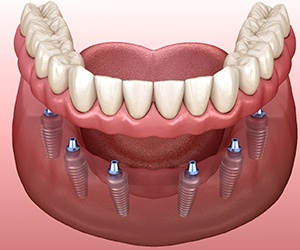Dental Implants – Falls Church, VA
Filling the Gaps in Your Grin
For many people with incomplete smiles, dental implants are often the top choice for replacing missing teeth. Our team at DentaCrafters PLLC is here to help you take full advantage of what dental implants have to offer. We can handle dental implant placement in-office, and we even offer All-on-4/6 treatments for replacing entire arches of teeth with strategically placed implant posts. Reach out to us today if you are ready to schedule your first consultation for dental implants in Falls Church.
Why Choose DentaCrafters PLLC for Dental Implants?
- Start-to-Finish Dental Implant Treatments
- All-on-4 and All-on-6 Available
- Focus on Excellent Customer Service
What Are Dental Implants?

Dental implants are quite different from the more traditional forms of tooth replacement that you might be familiar with. They are designed to be surgically placed in the jaw so that they can bond with the surrounding bone. (This process is known as osseointegration.) Once a dental implant has fused with your jaw, it can be used to support a restoration such as a crown, a bridge, or a denture – essentially acting as an artificial root for your replacement tooth or teeth!
The 4-Step Dental Implant Process
The dental implant process typically lasts several months, and the result is a sturdy, dazzling smile that you can show off with pride. Here are the steps we will need to take to rebuild your grin:
Initial Consultation:

We will need to confirm your candidacy for dental implants by taking a look at your mouth and jaw. Some preliminary work might be necessary before we can move on to the next step.
Dental Implant Surgery:

Placing dental implants requires a simple surgery that involves opening your gums so that we can work with the underlying bone. Our team will plan the procedure carefully to ensure that the implant posts are inserted in precisely the right spots in the jaw.
Osseointegration and Abutment:

Osseointegration usually takes a few months. Once the dental implants have finished bonding with the jawbone, we can attach a small metal component called an abutment to each post.
Delivery of Dental Implant Restoration:

We will take impressions of your mouth so that the final crown, bridge, or denture can be made. The abutments attached to the dental implants during the previous step of the process are what will be used to anchor the final restoration in place.
Benefits of Dental Implants

As one of the most reliable and successful methods for restoring missing teeth, dental implants come with a wide range of advantages for you and your smile. Not only can they help you regain a full and comfortable bite, but they can even preserve a more youthful facial shape while promoting a stronger jawbone. Keep reading to learn more about the benefits of dental implants and what you can expect after restoring your lost pearly whites.
Day-to-Day Benefits

- Stronger bite: Unlike traditional dental bridges or dentures, dental implants can help you regain 80% or more of your natural biting power. Not only will you be able to expand your diet to include healthier and more nutritious foods, but you won’t have to worry about your new teeth moving out of place when eating or talking.
- Simpler oral hygiene: Dental implants will look and function like your natural teeth. In addition to improving your bite, you also won’t need to use special products to keep them clean as you would with dental bridges and dentures. Simply brush, floss, and rinse them with mouthwash every day like normal to maintain them.
- Boost in confidence: Since your teeth won’t accidentally shift out of place while chewing or speaking, you’ll be free to show off a proud and healthy smile for all to see. You’ll likely feel more confident in your appearance, which can help boost your social/professional opportunities.
Health Benefits

- Jawbone preservation: Dental implants will be embedded directly into your jawbone, providing the stimulation necessary for proper bone growth. This will also help you maintain a more youthful facial structure in the long run.
- Improved overall health: Tooth loss typically comes with a variety of potential complications, including the risk of diseases. By rebuilding lost teeth from the roots up, you can end up avoiding a list of oral health issues, especially since they’ll be easier to take care of.
Long-Term Benefits

- Long-lasting solution: While dentures and dental bridges typically last about 10 years before needing to be replaced, dental implants can go for decades to the rest of your life. The best part: they only require minimal maintenance to make the most of them, meaning you’ll just have to practice good oral hygiene and visit your dentist every six months for checkups.
- Cost-effective treatment: Although dental implants come with a higher upfront value compared to dental bridges and dentures, their long-lasting results can actually help you save more in the long term. Not only will you not need to purchase special tools to maintain them, but they also won’t need replacements as often, which can make them a more cost-effective investment.
Who Dental Implants Can Help

Whether you lack one tooth or many, nearly anyone can get dental implants. It doesn’t take much to be a good implant candidate. That said, it’s still good to consult our dentists before you commit. They’ll examine your mouth to see if implants suit you. From there, they’ll draft a custom treatment plan that fits your current needs. If you’d like more details, we’ll happily share them. Just keep reading or call our office today!
Who is a Good Candidate for Dental Implants?

So long as you’re a healthy adult, you likely qualify for implants. Good candidates usually just need three key qualities. These are:
- Good Overall Health – Since implant placement is a surgery, your body must be healthy to bear it. Otherwise, the process could lead to complications.
- Great Oral Health – Cavities and gum disease can make implants fail. As such, these issues should be addressed before treatment.
- Proper Jawbone Density – To support implants, your jawbone must have sufficient strength and density. If it doesn’t, it won’t keep your new teeth secure.
If you aren’t a good implant candidate now, you can become one later. You’d simply need to get preliminary dental work. In particular, you might undergo tooth extraction, gum disease therapy, or bone grafting. Whatever the procedure(s), we’ll get you on track for a new smile.
Missing One Tooth

When you only lack one tooth, you should get a single implant and crown. This pair can replace your pearly white seamlessly, as it’ll blend with your smile. It’s also long-lasting – the average implant has a higher lifespan than a dental bridge. Best of all, an implant post and crown won’t remove healthy enamel from adjacent teeth. They’ll leave the structure of your other chompers untouched.
Missing Multiple Teeth

An implant bridge will work quite well if you’re missing several adjacent teeth. The latter prosthetic uses two implants fused to a pontic. As such, it’d restore your smile without relying on your natural teeth. The option is also more cost-effective than replacing each individual tooth.
(For many missing teeth throughout the mouth, opt for a partial implant denture. It’ll use several implants to anchor itself in place.)
Missing All Teeth

Should you lose all your teeth, you’d be wise to get a full implant denture. This prosthetic relies on four to six implants to restore an entire arch. Even better, it won’t slip around or fall like a standard denture might. The treatment’s use of implant posts ensures maximum stability and security. Plus, these posts tend to be long-lasting. As such, a full implant denture doesn’t need as many repair visits.
Understanding the Cost of Dental Implants

Dental implants are unlike other treatments when it comes to pricing, in that the final cost can vary a lot from patient to patient depending on their circumstances. To better understand why that is, just click the button below to learn about all of the factors that go into the cost of dental implants in Falls Church.
Preliminary Treatments & Dental Implant Surgery
Before you can get dental implants, your dentist needs to make sure that your mouth is healthy enough to hold your new teeth. This means you shouldn’t have an active oral infection and your jawbone is strong enough to support the implant posts. If either of these is an issue, you may have to receive gum disease treatment or a bone graft to prepare for implant surgery.
Speaking of which, the placement surgery is a separate cost from the implant itself. While other practices refer patients out for this procedure, we’re able to handle it entirely in-house, which saves you both time and money compared to having to visit a specialist.
The Parts of Your Dental Implant
Every dental implant is made of three distinct parts:
- Implant post—A titanium prosthetic tooth root.
- Restoration—The crown, bridge, or denture that goes on top of the implant.
- Abutment—The piece that connects the implant with the restoration.
The number of implants/abutments you need and the type of restoration you get can all make the treatment more or less expensive. Essentially, receiving a single tooth topped with a crown will be less compared to getting four to six implants that hold onto a denture.
How Dental Implants Pay For Themselves
While it’s true that dental implants cost more than traditional bridges and dentures up front, they are actually the better financial decision when you look at them over the long term. Regular prosthetics usually have to be replaced every 7-10 years, but dental implants have been shown to last 30+ years. This means that once you pay for them, that’s it. Generally, the price for one set of implants is significantly less than having to get four or five bridges or sets of dentures.
Does My Dental Insurance Cover Dental Implants?
We’ll only be able to confirm that your dental insurance can be used to help pay for your dental implants after we have spoken to you and gone over your policy. With that being said, most plans have benefits that can offset the cost of things like exams, X-rays, sedation, and the implant restoration. It’s less common for there to be coverage for the implant surgery. Be sure to read over your policy and reach out to our team if you have any questions about what you’ll be expected to pay out of pocket.
Making Dental Implants Affordable
If you can’t afford to pay for dental implants right now, don’t worry, you don’t have to! We’re partnered with CareCredit financing, which allows you to choose from a list of low-to-no-interest plans that allow you to spread the cost out across a few or several months.
And right now at DentaCrafters, we are offering a special that is as straightforward as it is enticing--$1,000 off your dental implant treatment. You can redeem this through our website in less than a minute, and your savings will be applied starting from your very first appointment with us.

